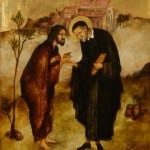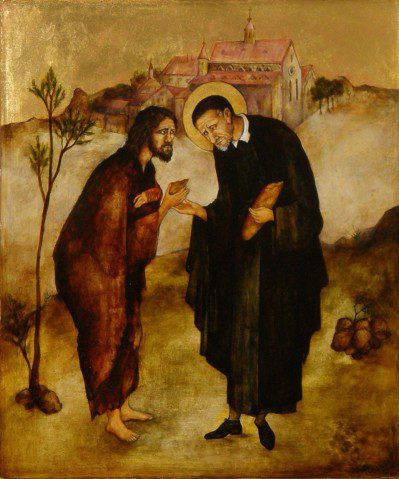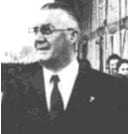 Tim Williams CM , Director of the Daughters of Charity in Australia, reflects on the THE EXPERIENCE OF VINCENT DE PAUL
Tim Williams CM , Director of the Daughters of Charity in Australia, reflects on the THE EXPERIENCE OF VINCENT DE PAUL
October 6, 2013
There are many facets to the life and spirituality of Vincent de Paul, whose feast we celebrated on September 27. One very significant aspect of Vincent’s spirituality came from his own life experiences.
Sometime in 1610 or 1611 Vincent de Paul’s Spiritual Director, Fr André Duval 1, put in the hands of Vincent a copy of Benet of Canfield’s The Rule of Perfection (La Règle de Perfection). 2 This work concerned a spirituality which focussed on the Will of God. As time went on, Vincent came to understand that the action of God was to be found in the experiences and people of his own life.
Some years ago, Fr Jean Morin CM 3 (pictured below), in speaking to the Daughters of Charity, put it in these words: 4
At the beginning and foundation of your Community, we should not picture Vincent de Paul shut up in his room, seated at a desk, with on his right the latest documents from the Council of Trent and on his left the constitutions of existing women’s religious orders, composing the rules that he thought of presenting to Marguerite Naseau, Barbe Angiboust, Marie Joly or some other Sister. For Vincent, everything flowed from life, event or experience, according to a phrase that he used at the end of his letter of August 5, 1642, to Bernard Codoing, the superior in Rome: “Such is my belief and such is my experience.” 5
This is certainly a key phrase, a principle that allows us to touch the deepest level of his personality and of his foundations. Vincent de Paul was not a man of theories. He
belonged more to the Old Testament prophets who read events and found God and God’s action in history.
God speaks and manifests himself in events. God was made manifest in GannesFolleville, in Châtillon-les-Dombes, in Vincent’s encounter with Louise de Marillac and with Marguerite Naseau. Vincent looked at the event, reflected on it, analyzed it and , responded to it.
All these make it very difficult to understand a Vincentian foundation, to enter, for example, into an understanding of your Community and its spirit by way of principles,
rules and structures because this is not the route that your founder took. It would have been entirely contrary to his mindset, to his type of personality and his type of holiness. Formulations, structures, and rules were always less important than experience and life. Not that he didn’t attach any importance to them. God knows how often he reminded us of the rule. But for him, life experience and events were first and always the priority. He wrote to Monsieur Portail (at Marseilles) on February 14, 1648:
“l have no doubt that the Administrators 6 intend to have the upper hand in everything. When they speak to you again about the rules for the hospital, please tell them, as if it were coming from you, that a good maxim for those whom God uses to establish holy and new works is to defer as long as possible making the regulations. Experience
teaches that what is feasible at the beginning is sometimes harmful as things go on, or subject to troublesome inconveniences and, on this account, some Communities, like
the Carthusians, did not draw up their Constitutions until a hundred years had passed.” 7
We must listen to life, respect life, and interpret life. We will see in following the history of your origins how Saint Vincent followed this principle and how your Community and your style were dictated by events, especially by the cries of the poor. Constituted in this way by the rhythm of experience and by the very heart of events your Community found itself quite naturally adapted to the needs of the poor and of the times.
And so we are reminded that Vincent de Paul constantly looked at events, reflected, analysed, and then responded. Listening to life, respecting it, and interpreting it were fundamental to his spiritual life.
We should also note that it was not only from Benet of Canfield that Vincent de Paul drew spiritual inspiration. He also drew from Pierre de Bérulle, Francis de Sales 8, André Duval, his encounters with Louise de Marillac, and of course from Scripture and other sources. I would suggest that though we may consider Vincent’s sources of inspiration to have been eclectic, they were sources that resonated with his life experiences – so that the life experiences themselves became a unifying factor in the sources from which he drew.
******************
FOR REFLECTION
1. Have there been events and people in my own life where I can see that the Providence of God has been acting ?
2. How do the sources from which I draw my spiritual inspiration and strength resonate with my own life experiences ?
********************
1 For more information on André Duval see: Duval, André. Vincentian Online Library (VincentWiki) accessed on
September 11, 2013 at: http://famvin.org/wiki/Duval,_Andr%C3%A9
2 For more information on Benet of Canfield see: Canfield, Benet of, Vincentian Online Library (VincentWiki)
accessed on September 11, 2013 at: http://famvin.org/wiki/Canfield,_Benet_of
3 Fr Jean Morin CM (1922-1987) was a Vincentian Priest of the Toulouse Province in Southern France.
4 Morin CM, J., Vincent de Paul, Founder, Echoes of the Company, Paris, France, March-April 2012, No. 2. pp 138-139. Photograph taken from Koch CM, Bernard, et al., Monsieur Vincent, Témoin de L’Évangile, Animation Vincentienne, Toulouse, 1990.
5 Coste CM, Pierre, Vincent de Paul – Correspondence, Conferences, Documents, New City Press, Brooklyn NY, 1990, Vol 2, p 3162
6 This refers to the Administrators of the hospital for the galley slaves.
7 Coste, Vol 3, p 272.
8 For more information on Francis de Sales see: Francis de Sales, Vincentian Online Library (VincentWiki) accessed on September 15, 2013 at: http://famvin.org/wiki/Francis_de_Sales
Tags: Experience, Tim Williams, Vincent


